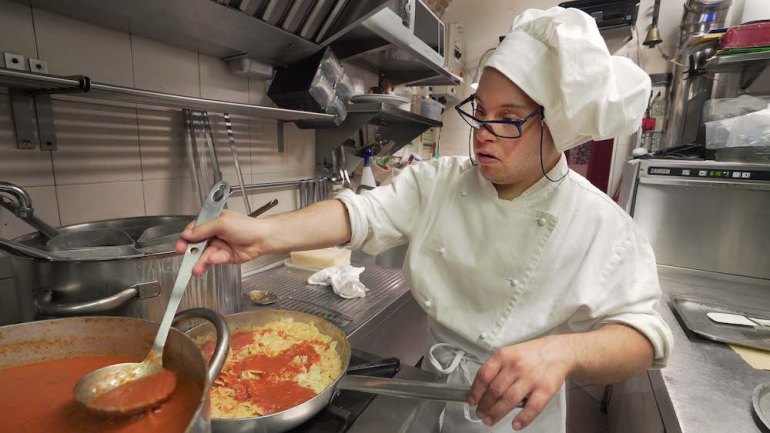Trainee chef Mirko Piras in ‘Chef Antonio’s Recipes for Revolution’.
Chef Antonio’s Recipes for Revolution is the first feature documentary to be granted the status of an Australian-Italian official co-production. Since a special treaty with Rome was signed in 1993, there has been only one previous Australian co-production with Italy – the 2015 drama, The Space Between. But our project didn’t start out that way. All film financing is like a roll of the dice. You never know what numbers will come up.
Commissioned by the Melbourne International Film Festival’s Premiere Fund, this feature length disability rights documentary tells the story of an inspirational chef, Antonio de Benedetto, who is on a quest to change the world with his delicious Italian food.
His apprentices are Mirko Piras, a young man born with Down syndrome, who dreams of becoming a great chef ‘just like Antonio’ and Jessica Berta, an ambitious young waitress who’s also set her sights on a career among the pots and pans.
Their tiny kitchen is the beating heart of a revolutionary restaurant and hotel like no other. Both are staffed by young men and women living with Down syndrome who come from all over Italy to train and work in hospitality, so they can take their place at the table of life. The film is a journey through their lives and loves, dreams and dramas. It is almost exclusively filmed in Asti, north-west Italy, with a few scenes in Rome and Bergen, Norway.
Produced by Lisa Wang (Black Sheep Films), myself (Yarra Bank Films) and Turin producer, Alessandro Borrelli (La Sarraz Pictures), the co-production ensures that the documentary will be released nationally throughout Italy and Australia.
I started filming in Asti in October 2017, and the co-production idea evolved over a similar three-year time frame. Curiously, the film’s financing mirrors, in many ways, the slow boil of shooting an observational film.
Purely by chance, I met Alessandro Borrelli over drinks, during a Screen Australia party to welcome an Italian producer delegation to the 2018 Sydney Film Festival. At that stage I’d already completed two film shoots in Asti with support from Screen Australia. Borrelli loved the concept of the film, not least because the story takes place in his home region of Piemonte, famed for its culinary and wine heritage. His company produces and distributes drama and documentary, with a strong emphasis on Italian cinema release and social issue films.
As I travelled backwards and forwards to Italy the idea for the co-production with Borrelli became a reality. But the dilemma for us was that the film had already been fully financed in Australia. It would be another six months before Borrelli managed to get funding support for the film at their end, from the Minority Co-production Fund and the Italian Ministry of Culture, aka MIBACT. But the Catch 22 was MIBACT’s support was totally conditional on the production becoming an official co-production under the 1993 treaty guidelines.
And there-in lies the rub of our co-production story. Normally an official co-production has to be applied for in the financing stage of a production: well and truly before ‘pre-production’ commences. But I was already into my fourth shoot by that stage. That’s documentary!
With an observational film like ours, where the story evolves over time – in this case over seven shoots and three years – it was hard to say when the traditional stages of ‘pre-production’, ‘production’ and ‘post’, started and finished! Even in the latter stages of fine cutting with editor Andrew Arestides, cinematographer Jenni Meaney and I were embarking on our seventh and final shoot in Italy, as the Covid crisis hit the north.
Together, Borrelli and I put a compelling case to Screen Australia and the Italian Ministry of Culture arguing that the complicated, drama-focussed co-pro application process, ‘submission before production commences’ didn’t sit comfortably in our case.
Fortunately for us, both organisations understood and appreciated the unusual nature of the process of financing and making this observational style film and were prepared to accept an unusually late application – their flexibility was remarkable. Even more so, given the unfolding global crisis. These bi-national discussions were undertaken while Italy was tackling one of the first major deadly outbreaks of COVID-19, and Australia was closing down, preparing for the pandemic to hit. Despite this challenging context, the Italians remained clearly committed to entering into this co-production, as did Screen Australia. By the time the co-production was clinched Italy was opening up and Melbourne was going into hard lock down.
2020 has been a time of great uncertainty for us all. COVID-19 will impact financing, filmmaking and cinema releases for a prolonged and unknown time. But our film shows that flexibility, imagination and collective good will can build bridges, culturally and financially, even in the most difficult and challenging of times. Persistence is a necessary pre-requisite for producing. In our case it was clearly on the menu.
Chef Antonio’s Recipes for Revolution will have its Australian premiere at MIFF 2021 and be released in Australian cinemas by Antidote Films. With all the devastating news that COVID-19 has delivered in Italy and Australia, we anticipate that Chef Antonio’s Recipes for Revolution will bring audiences hope and humour, along with delicious Italian cuisine. The film is executive produced by Jenny Lalor, Andrew Myer, Roger Savage and Gil Scrine. It’s financed by Screen Australia, MIBACT – Minority Co-production Fund – Italian Ministry of Culture, Film Victoria, Film Commission Torino – Piemonte, the AndyInc Foundation, Soundfirm, Documentary Australia Foundation and the Melbourne International Film Festival Premiere Fund.



